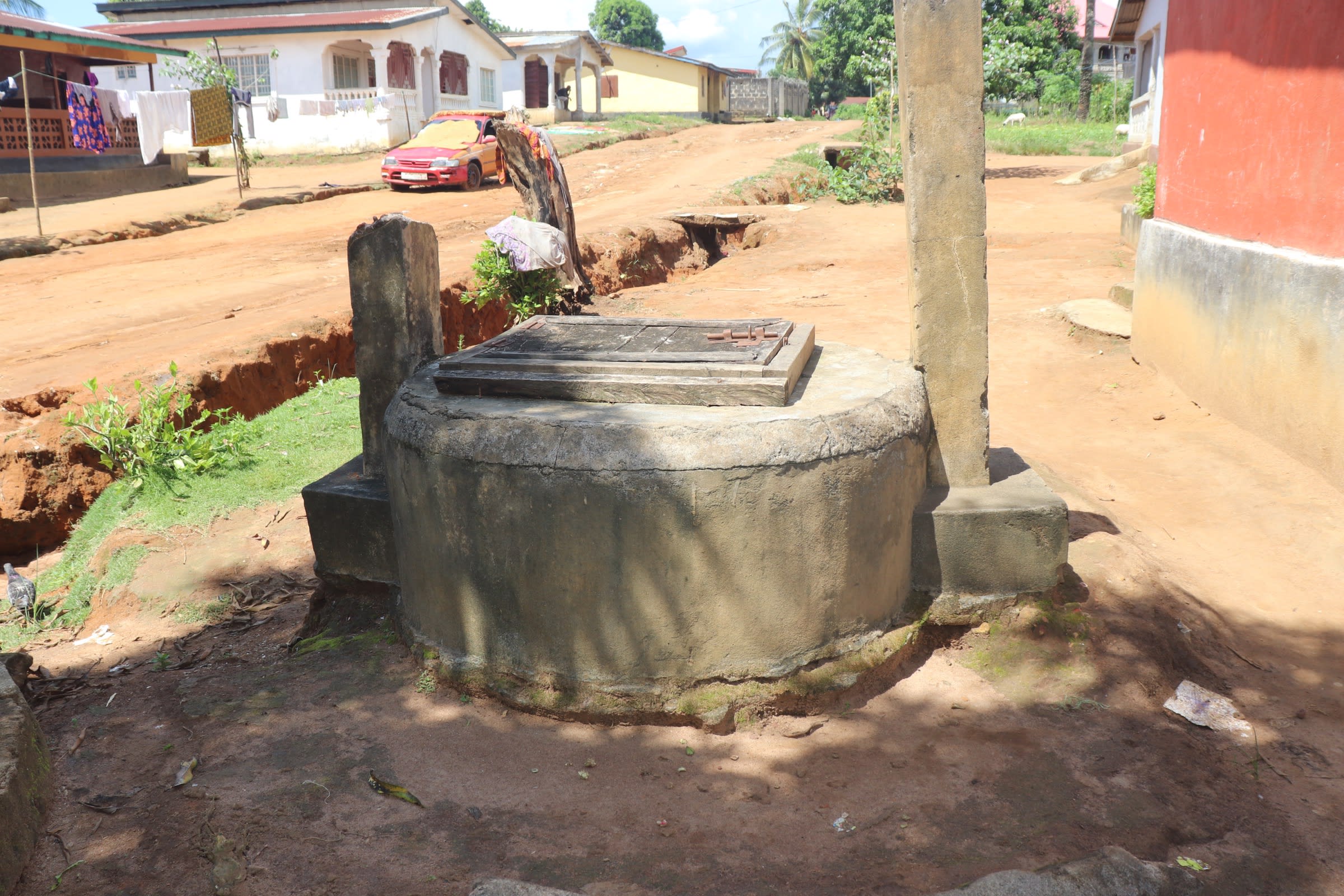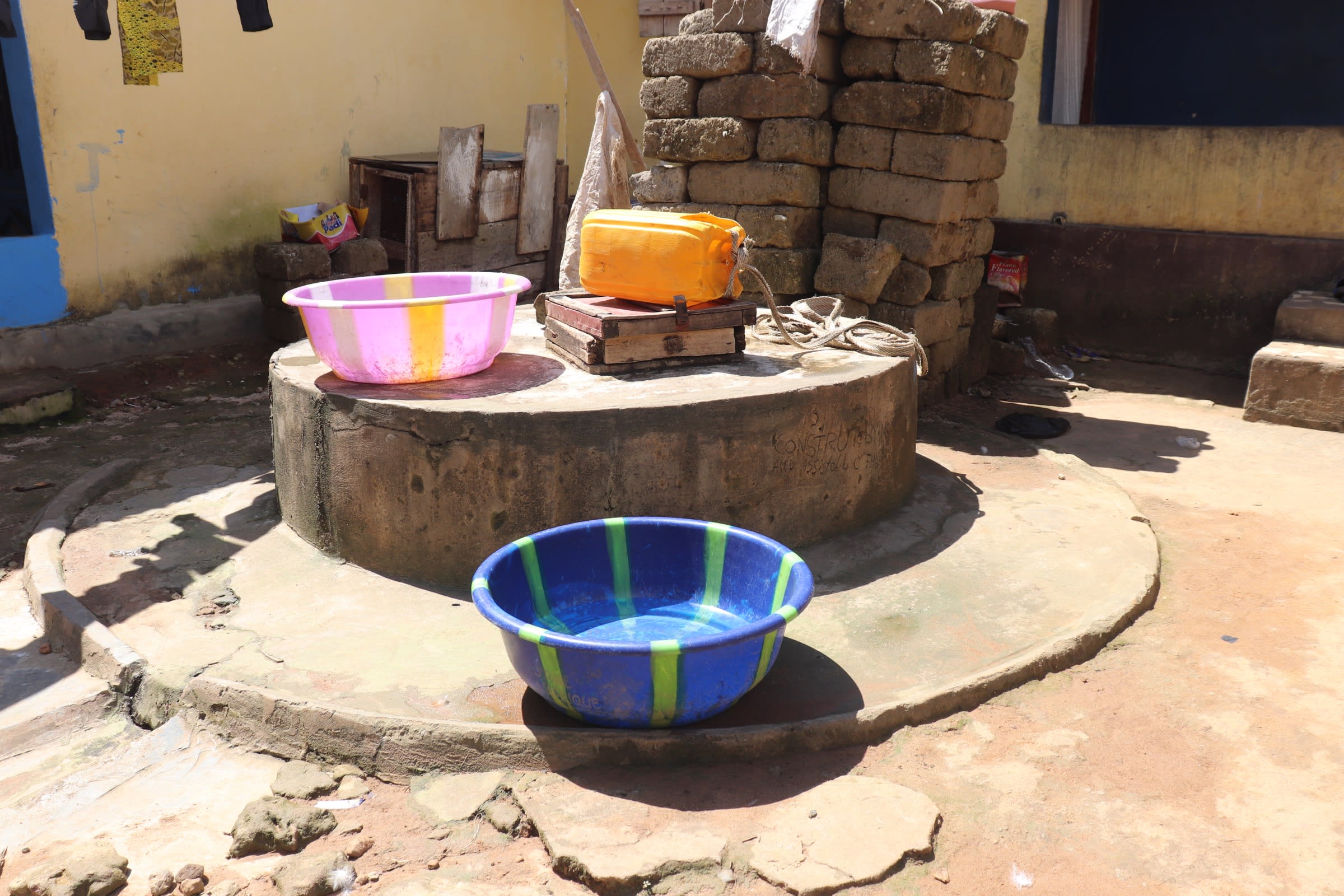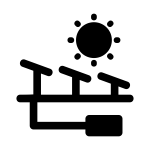The entire length of the Rotifunk community is lined with contaminated water points that cause serious water-related illnesses. In the wet season, people here have ready access to all the unsafe water they could drink. In the dry season, their options dry up with the water points. Those who can afford it resort to purchasing water whenever they can. Those who can't afford it get sick.
"I am fortunate to have parents that can afford to buy bundles of water," said 17-year-old Kadiatu K. "I make sure it is never wasted. Most of the plastic water bundles are still contaminated because they are not very cared for."
The reason the community's current wells are unsafe is namely their close proximity to latrines. When we surveyed the community's eight wells to see whether one might be good for rehabilitation, we found none of them were up to our standards. We require that a well be at least 30 meters from the nearest latrine, but the farthest distance recorded was 22.6 meters, with the shortest being 8.4 meters. One of our field officers said, "It was really quite disgusting to think people would actually drink water from any of those wells."

Water Street got its name from the three water streams that once ran across the bottom of the community's hill. Over the years, global warming and land sales have absconded with all but one polluted stream. Now, everyone does laundry and bathes in the same place they fetch their water for drinking, and plastic bags float in the water.
"[On] Water Street, a person should not have to suffer for water, but the name is far from the reality on the ground," Kediatu said.
Special groups have been formed by the community to go out and search neighboring communities for safe water every day. While some wait to accomplish all their daily chores until the group returns, others decide they cannot wait and use the local unsafe water instead.

The people who own the community's private wells keep them locked up tight against intruders. So when the public wells dry up, the unlucky people who can't purchase water end up fetching water from the one remaining stream at the end of Water Street, where all the runoff from the people's animals, garbage, and latrines naturally flows.
"It is never easy, especially in the dry season, to fetch water," said 52-year-old trader Sefiatu Wurie. "When people see you coming towards their water well, the immediate reaction is to lock it. After sessions of repeated begging, you might just be allowed to get one or two containers. Never enough for preparing food, let alone for other household chores. I sometimes sacrifice extra money and pay people with wheelbarrows or motorbikes to make sure I have sufficient water in the house. The hardest to get is drinking water, and without money to buy water bundles, I settle for whatever I get."
The health consequences from drinking the water in this community range from mild to severe. Women, men, and children are covered with skin rashes all over their bodies. If left untreated for a long period of time, people's skin will flake off and become discolored. People suffer from typhoid, cholera, and dysentery from drinking unclean water. There are also high instances of malaria from all the stagnant water sources and unhygienic environments.
"I am a little picky about the water my children drink, not much for myself," Sefiatu said.
What we can do:
Well Rehabilitation
The well marked for this overhaul is dry for a few months every year and needs major work to supply adequate, clean water to the community year-round. The drill team will remove the pump, and a hand auger will be lowered inside and powered by a drill team. This hand auger will allow the team to drill several meters deeper to hit a sufficient water column to ensure the well supplies water throughout all seasons.
As the team drills, the casing will be installed, transforming the bottom of this hand-dug well into a borehole. PVC piping will connect this lower system directly to the pump, a set-up that we know will also improve the quality of water.
Solar pump and filter system
This system will use solar as its primary power source but will be backed up by batteries and a small generator. This system is designed to be maintained and repaired when needed with components that can be purchased locally.
This water distribution system will use several methods to purify the water. The water will be pumped from the well using a solar pump into an overhead 5,000-liter storage tank. Once the tank is full, it will be released by valve and then pass through a stainless steel #80 mesh filter. This filter can be cleaned and reused repeatedly. The larger particulates will be removed as the water transfers into a second 5,000-liter storage tank.
The water at this point will pass through two 20-inch bag filters. The first will filter down to ten microns, and the second will filter down to five microns.
The water will then pass through an ultraviolet system for treatment. The ultraviolet treatment has proven to remove 99.9% of bacterial contamination.
The water will be separated into two distribution lines. The first will be made available to the community for general use (washing clothes, cleaning, and bathing). The second line will flow through a sensor that activates a chlorinator. The proper amount of chlorine will be injected into the water. Injecting a small amount of chlorine into the water will disinfect the containers community members use to collect and store water. The free chlorine levels will be below WHO safe standards. This water will be available as drinking water.
Once this plan is implemented, everyone within the community will have access to safe drinking water, even through the dry months.
Training
Our team will offer hygiene and sanitation training sessions for three days in a row.
Community members will learn how to make a hands-free handwashing station called the "tippy-tap." We will use these tippy taps for handwashing demonstrations and will also teach about other tools like dish racks and the importance of properly penning in animals. We will highlight the need to keep restrooms clean, among many other topics.
This training will also strengthen a water user committee that will manage and maintain this new well. They will enforce proper behavior and report to us whenever they need our help in solving a serious problem, like a pump breakdown.

 Solar Pump
Solar Pump
 Rehabilitation Project
Rehabilitation Project






































